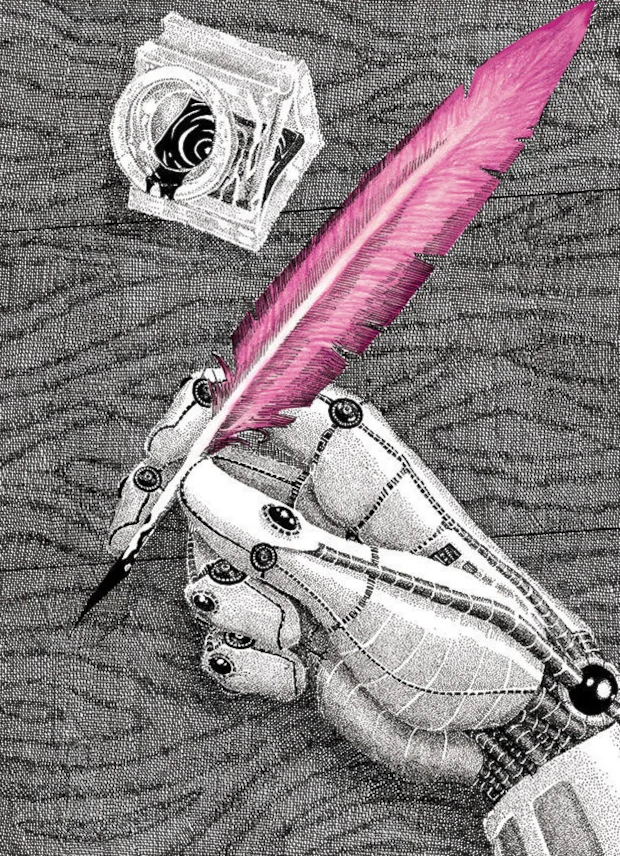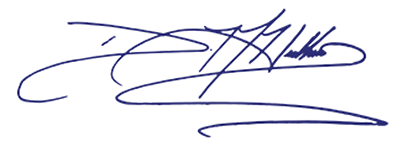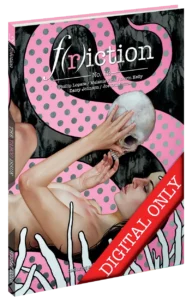
Editor’s Note
Words By Dani Hedlund, Art By Brian Demers
Dear lovely reader,
After F(r)iction#10 came out, we received a piece of troubling mail. Written on a floral greeting card in beautiful handwriting, a reader had written in to explain that she had found our publication last year at her local Barnes & Noble. She was instantly hooked, she said, and found a kinship in our weirdness. But she wanted to express her dismay about one of the stories we published, explaining that she found it too dark, that she believed it aggrandized destruction and male ego. She didn’t threaten to stop reading F(r)iction. In fact, her note ended with great excitement about continuing to read our issues. She just wanted us, the editors, to know that she deeply disliked the story and asked why we included it.
This letter stuck with me. In fact, it haunted me, and I put off writing back for months. I was dismayed not just because someone who clearly “got us” disagreed so strongly with a story choice, but because her concerns brought to light an issue that had been brewing under the surface of every editorial meeting we’ve had this year: Should we publish works that could offend our readers?
Four years ago, when we started F(r)iction, this never came up in meetings. Our mission was clear. We wanted to create a magazine that was different, that pushed boundaries, that challenged conventions. The only thing that mattered in any editorial meeting was whether a story or poem lingered, was beautifully written, and made us think.
So why did this letter trouble me so much?
The answer is simple. We are no longer that start-up journal. Back then, it was easy to be bold because everyone thought we were going to fail. But now, things are different. We’ve worked ourselves to the brink of insanity, all in pursuit of having readers just like this woman, readers who care enough to write in. I began to wonder, were we risking throwing that all away by pushing too hard against those boundaries? Do we need to start playing by a different rulebook now that we are more established?
So I reread the story in question dozens of times. Then I looked through all the editorial correspondence about it. When that gave me no answers, I picked up back issues of F(r)iction and reread pieces I haven’t looked at in years. What I discovered was that the stories we took chances on, the most controversial and different, thosewere the ones that stayed with me—the ones that made me set the book down, take a moment to think, to rethink.
And isn’t that the whole point?
When we named this publication F(r)iction, we wanted to create just that—frictionin the mind of the reader, frictionin the industry, frictionin our own hearts.
Ultimately, this letter ended up redoubling the conviction of our original mission. We went back to our editorial meetings with a new focus: to find the works that create the most tension and fill an entire issue with them. Work that uses uncomfortable content to say big, bold things about the world. That fills dark moments with meaning. That shows every offense matters. That shines a light on the things that are easy to cower away from—and with that light, bring at least a small amount of understanding.
Welcome, dear reader, to the Taboo Issue.
To be honest, many of the works in this issue disturb me. There’s a part of me—the part that tells me not to talk about politics, religion, or sex at dinner parties—that wants to hide this issue in a shoebox and never let you near it. But then the other part of me remembers times when these taboo subjects have challenged the way I think about fundamental aspects of our world. And if we can’t talk about them, and if we can’t create art that challenges the way we think about them, then what’s the point of art? Of literature? Of F(r)iction?
So I hope you’ll join us for our most controversial issue yet. I hope you enjoy it; I hope you hate it; I hope you pick up a lovely greeting card and tell us what you thought. Because at the end of the day, our goal as publishers and editors is to ensure that you care enough about something you read to think about it, to be challenged by it, even to complain about it. Because that’s how we know we’re doing our jobs right.
Cheers,

Dani Hedlund
Editor-in-Chief
